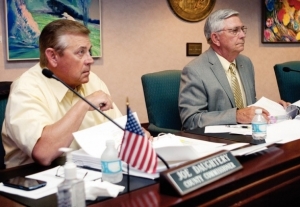'No sacred cows': Commissioners talk budget
By Steve Herring
Published in News on June 7, 2013 1:46 PM

News-Argus/STEVE HERRING
Wayne County Commissioners Joe Daughtery, left, and Ray Mayo listen to discussion about the county's proposed budget during a six-hour meeting Tuesday. Daughtery urged the board not to let "sacred cows" influence their decisions.
Wayne County commissioners on Tuesday spent more than an hour discussing the county's fire district taxes.
It is too late to do much with a review of those rates for this year, but commissioners said they want the information available to be prepared for the 2014-15 budget year.
The county does not, and is not, trying to control the department's budgets, they emphasized. But commissioners indicated they should know more about the individual departments' revenues and expenditures.
"Going through the budget, I am hoping that we will all agree there will be no sacred cows here," Commissioner Joe Daughtery said. "It is a tough decision to go through a budget and make decisions of where you make cuts, where you make pluses. Where you add, subtract.
"A lot of people are affected by this budget. But I am hoping that this time we can go through this budget and look at all avenues, all taxes that are coming into our county, all expenditures and that we not set aside those special areas that we not touch. I hope we will all be able to have some open dialogue on that."
County Attorney Borden Parker told Daughtery the fire departments can request whatever they want, but that commissioners set the fire tax rates.
Also, the county contracts with the fire departments to provide fire service. The departments are independent corporations that are not controlled by the county, he said.
It was while looking at fire tax revenues that Daughtery said he could be broaching the first sacred cow.
Daughtery asked County Manager Lee Smith if anyone in the county finance department went through a fire department's budget line item by line item to justify the expenses.
"No," Smith said. "All we do in finance and my office as the budget team is to look to make sure that they say their expenditures and revenues match."
Looking through the county budget it is difficult to determine if a fire tax rate requested by a fire department is justified, Daughtery said.
"We don't have access to that (budget)," he said. "In this (county) budget book here it just says revenue from the fire tax and the expenditure for that service. There is no breakdown at all as into what is expended, how much reserves there are."
Daughtery said he has been told that "that is the way it has always been done" -- submitting a budget to balance revenues to expenditures.
"I have some serious issues with that in regards to the changes that take place in property values that determine what that fire tax amount will amount to," he said.
For example, Progress Energy's new multimillion-dollar Lee power plant in the Mar Mac fire district, he said.
The plant will make a "dramatic" impact on tax revenues in that district, he said.
Some fire departments are very financially stable, while smaller ones struggle, he said.
"It is a real issue that at some point someone is going to have to address," Daughtery said. "We cannot continue to go down the road that has been there for the last century and that is you submit a budget for this amount and you automatically approve it, it is your money do whatever you want to with it."
He also expressed concerns that the departments also receive property tax revenues.
"I realize I am walking on thin ice here, but somebody has to say it," Daughtery said.
Daughtery said he is concerned about the disparity between departments and that the county has to find a path to proper funding "whether it is through mergers or whatever."
He also questioned an annual appropriation of $1,800 annually for each department. The money traces back to the late 1950s when the departments were formed and needed help, Commissioner Wayne Aycock said.
Initially, the departments received $900 each, Aycock said.
"This is one of those fees that comes out of our budget going into fire departments," Daughtery said. "I would just urge us since they have taxing authority and they have their own revenue source that we find a way to truly identify what the costs are to provide fire service.
"I am not trying to take dollars from fire departments here. What I am trying to do is have proper accounting."
Smith presented his budget proposal Tuesday. The county's gross budget of $161 million is slightly more than the $159 million, which was originally budgeted for 2012-13.
However, a more accurate figure to use when talking about budget totals is the net budget amount of $120,127,740 compared to the current $121,288,782 -- a reduction of $1,161,042 to lower the tax rate, Smith said.
Smith has recommended commissioners reduce the tax rate from the current 70.25 cents per $100 worth of property value to 67.5 cents -- a decrease of 2.75 cents.
There are no fee increases except for the landfill tipping fee, which would increase from $30 per ton to $31.50 to cover expenses associated with a new electronic recycling program and changes in the overall recycling program.
The board will meet again Monday at 8 a.m. to continue its discussions and the public will have its chance to comment on the proposal during a Tuesday, June 18, public hearing at 9:30 a.m.
The board will meet in special session on June 25 at 9 a.m. to consider adopting the budget.
All of the meetings are open to the public and will be held in the commissioners' meeting room on the fourth floor of the county courthouse annex.
